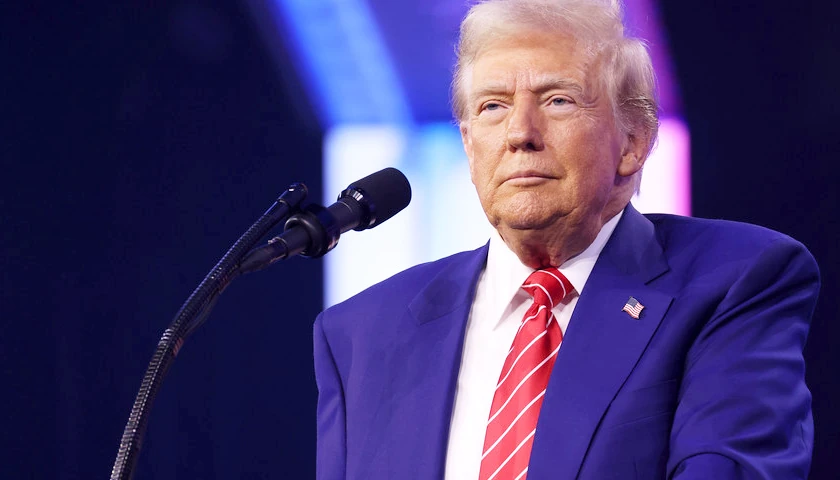by Curtis Ellis
President Trump appeared at the World Economic Forum in Davos, Switzerland this year as vir triumphalis—the man of triumph. He presides over an American economy that boasts low unemployment, rising wages, and a booming stock market.
Most notably, as he was quick to remind his audience in the Swiss Alps: “America achieved this stunning turnaround not by making minor changes to a handful of policies, but by adopting a whole new approach centered entirely on the well-being of the American worker.”
In his first pilgrimage to Davos in 2018, President Trump declared: “America First is not America alone.”
In 2020, he restated the ethos underlying his nation-centered vision: “A nation’s highest duty is to its own citizens . . . Only when governments put their own citizens first will people be fully invested in their national future . . . restoring the bonds of love and loyalty that unite citizens and powers nations.”
Trump’s focus “on improving the lives of everyday Americans” and his call on all governments to “put their own citizens first” is heresy to the Church of Davos, which worships the god of the global economy.
But results matter and the high priests now recognize the man of triumph may well be onto something.
In the run-up to this year’s gathering, commentators were wringing their hands over the future of democracy and capitalism, concerned about a rising tide of populism and nationalism.
President Trump hinted at the way through the maelstrom when he blasted the North American Free Trade Agreement as the poster child of “the decades-long failures of the international trading system.”
“The agreement shifted wealth to the hands of a few, promoted massive outsourcing, drove down wages, and shuttered plants and factories by the thousands,” the president said. “The plants would leave our country, make the product, sell it into our country. We ended up with no jobs and no taxes; would buy other countries’ product.”
The people dismissed as racist, ignorant or emotional—including those who carried Donald J. Trump to the White House—want control over their economic lives. Whether in Pittsburgh, Beirut, or Paris, they are tired of government policies that “shifted wealth into the hands of a few.”
The collapse of the American middle class coincided with a growing concentration of wealth and ownership in America.
“Our world looks very different than it did in the mid-1970s,” a high-water mark for the middle class, writes Matt Stoller of the Open Markets Institute. “In 1974, we often shopped at a local store. Today we live in a world dominated by chain stores . . . In the commercial realm, more and more of us work for really big companies. Farmers must sell grain, buy seeds . . . through a small group of giant companies. Every small business is at the beck and call of a credit card and payments cartel . . . Concentrated power is in every nook and cranny of commerce” and society.
It has taken a toll on our civil society as well as commerce. “Civic leaders, who used to run local stores, churches, small businesses, local law firms, and farms, have been washed away by a wave of Walmarts and Targets and Amazons,” Stoller laments. (Stoller’s excellent Goliath: The 100-Year War on Monopoly Power and Democracy is well worth reading.)
Meantime, urbanist Joel Kotkin writes, “relentless consolidation and financialization has devastated Main Street. In the great boom of the 1980s, small firms and start-ups powered the economy, but more recently the rates of entrepreneurship have dropped as mega-mergers, chains and on-line giants slowly reduced the scope of opportunities.”
The concentration of wealth and the consolidation of ownership into fewer and fewer hands, epitomized by the Davos crowd and Wall Street banks, has been counterproductive to broad-based wealth and prosperity.
Walmart, controlling the lion’s share of retail sales, could dictate prices to manufacturers and tell them to move to China.
The People’s Republic of China is at once a sole-source supplier and a proxy for monopoly corporate power writ large.
Decentralizing economic power is key to restoring both the economic and social health of our nation.
The notion that big business is somehow “more efficient” and therefore ”better” than small business is questionable. The advantage large enterprises have over smaller ones, in many instances, is a function of man-made legal structures rather than the laws of nature.
There is a political factor in the equation. Abraham Lincoln’s Republican Party promoted “Free Soil, Free Labor, Free Men,” hearkening to Thomas Jefferson’s idea of a nation of yeoman farmers. We would work for ourselves rather than an absentee or corporate owner.
Small business—Main Street—was long the traditional backbone of the Republican Party. The owners of small- and medium-sized factories, banks, and independent shops financed and provided the shock troops for the draft Goldwater movement that began the conservative takeover of the GOP.
And while the anti-monopoly trustbusters of the early 1900s are associated with the Progressives, their reforms as often helped entrench monopolies as eliminate them. The post-Watergate Democrats and the Clinton Administration helped to further consolidate finance, media, and other industries.
It is time for those of us who believe in private ownership of property to ensure that everyone has access to some. The Federal Housing Authority and the G.I. Bill promoted widespread ownership of property, the foundation of America’s signature middle class and broad-based prosperity. William Levitt, the founder of Levittown, the first post-World War II suburb, said, “No man who owns his own house and lot can be a Communist. He has too much to do.”
America Firsters support national sovereignty and oppose the concentration of political power in faraway hands. Similarly, we must promote economic power at the local level—localism, not globalism.
Undoing the concentration of wealth and the concentrated ownership of property and businesses is essential to restoring our nation’s economic and social health, renewing faith in democracy and ensuring capitalism works for everyone, not just a remote few.
– – –
Curtis Ellis is policy director with America First Policies. He was also a senior policy advisor with the Donald J. Trump presidential campaign in 2016.





